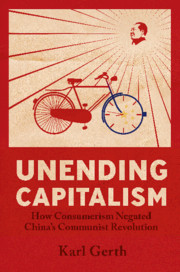Book contents
- Unending Capitalism
- Unending Capitalism
- Copyright page
- Contents
- Figures
- Acknowledgments
- Abbreviations
- Introduction
- Chapter 1 Self-Expanding and Compulsory Consumerism
- Chapter 2 Building State Capitalism Across 1949
- Chapter 3 Soviet Influences on State Consumerism
- Chapter 4 State Consumerism in Advertising, Posters, and Films
- Chapter 5 State Consumerism in the Service Sector
- Chapter 6 Consumerism in the Cultural Revolution
- Chapter 7 The Mao Badge Phenomenon as Consumer Fad
- Afterword
- Notes
- Bibliography
- Index
Introduction
Consumerism and Capitalism
Published online by Cambridge University Press: 08 May 2020
- Unending Capitalism
- Unending Capitalism
- Copyright page
- Contents
- Figures
- Acknowledgments
- Abbreviations
- Introduction
- Chapter 1 Self-Expanding and Compulsory Consumerism
- Chapter 2 Building State Capitalism Across 1949
- Chapter 3 Soviet Influences on State Consumerism
- Chapter 4 State Consumerism in Advertising, Posters, and Films
- Chapter 5 State Consumerism in the Service Sector
- Chapter 6 Consumerism in the Cultural Revolution
- Chapter 7 The Mao Badge Phenomenon as Consumer Fad
- Afterword
- Notes
- Bibliography
- Index
Summary
The Introduction introduces the primary questions of the book: what are the implications of the spread of consumerism in the Mao era, 1949–76? The argument is simple: consumerism is a correlate of capitalism. Both depended on each other to expand. The implication: the spread of both define the political economy of the PRC not as “socialist,” as is commonly assumed, but rather as capitalism. As the book demonstrates, the Mao era was a specific variety of capitalism called “state capitalist” because the state attempted to channel and suppress consumerism and consumption generally to facilitate rapid industrialization. The chapter justifies labeling these state attempts to control consumerism with a coined term, state consumerism. The rest of the Introduction explains the specific use of these three key terms: consumerism, capitalism, and socialism. Finally, the chapter suggests how the rest of the book attempts to demonstrate why this reinterpretation of “Communist China” as developing a form of capitalism helps readers understand the history of the era and new and better ways.
Keywords
- Type
- Chapter
- Information
- Unending CapitalismHow Consumerism Negated China's Communist Revolution, pp. 1 - 9Publisher: Cambridge University PressPrint publication year: 2020



